How Labour’s tax row split the party
Shadow chancellor appears at odds with the majority of party on tax cut pledge
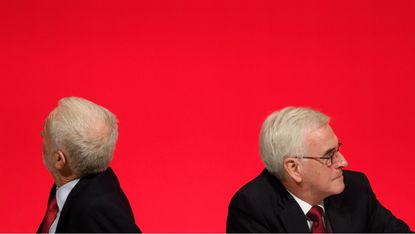
While Philip Hammond’s “austerity-ending” budget appears to have been generally well-received by the mainstream media, the public at large and restive Tory backbenchers, within the opposition it has ignited fierce debate.
The row that has ripped through Labour this week focuses on the shadow chancellor’s decision to back a tax cut for high-earners.
John McDonnell appeared at odds with many in his party when he reiterated his support for the 40p rate change, arguing that the “winners” would include mid-ranking doctors, late-career academics and school leaders, claiming these were hardly people he would consider “the rich”.
Subscribe to The Week
Escape your echo chamber. Get the facts behind the news, plus analysis from multiple perspectives.

Sign up for The Week's Free Newsletters
From our morning news briefing to a weekly Good News Newsletter, get the best of The Week delivered directly to your inbox.
From our morning news briefing to a weekly Good News Newsletter, get the best of The Week delivered directly to your inbox.
Yet the move has sparked an ideological backlash from many MPs and grassroots members, and exposed a deep division over where the line falls between the “many” and the “few”, the slogan which drives Labour’s entire strategy.
Labour MPs concerned about McDonnell’s support for tax cuts for higher earners have tabled a budget amendment that would force the Government to publish an assessment of its impact on child poverty.
MP Nisa Nandy wrote in LabourList that the government’s claim austerity was “coming to an end” should allow her party to be “much bolder about our opposition to these political choices, campaigning against austerity and highlighting its crushing impact on so many people who do not have a voice. Now is the time to roar”.
Other senior MPs, including former leadership candidates Andy Burnham and Yvette Cooper, have also opposed the shadow chancellor’s stance.
Setting out the current conundrum facing the Labour leadership, Owen Jones in The Guardian writes. Jeremy Corbyn was elected to party leadership as an inflexible economic radical., yet “now his leadership stands accused, by Yvette Cooper, of backing regressive Tory income tax cuts that will overwhelmingly benefit the well-off, and all for the sake of cynical electioneering”.
Former Conservative voters earning £45,000 to £50,000 were crucial to the party’s surge at the last election, and McDonnell has repeatedly sought to keep them on side.
However, Stephen Bush in The New Statesman says that “this is not the beginning of an ideological split over economics”, arguing that “externally, no-one cares about the Budget and there are no votes to be lost over supporting a tax cut.”
“What should trouble Labour is that they have looked so incoherent and wobbly over a policy set two years ago, and that the Conservatives appear to have finally found a political narrative that might actually win over some of the voters they lost last time”.
Bush’s New Statesman colleague, Patrick Maguire, agrees. “That there was no coordinated consensus on the finer details of such an expensive policy where the will of the party ought to have been settled should set alarm bells ringing,” he writes.
Create an account with the same email registered to your subscription to unlock access.
Sign up for Today's Best Articles in your inbox
A free daily email with the biggest news stories of the day – and the best features from TheWeek.com
-
 Why au pairs might become a thing of the past
Why au pairs might become a thing of the pastUnder The Radar Brexit and wage ruling are threatening the 'mutually beneficial arrangement'
By Chas Newkey-Burden, The Week UK Published
-
 'A direct, protracted war with Israel is not something Iran is equipped to fight'
'A direct, protracted war with Israel is not something Iran is equipped to fight'Instant Opinion Opinion, comment and editorials of the day
By Harold Maass, The Week US Published
-
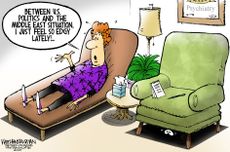 Today's political cartoons - April 17, 2024
Today's political cartoons - April 17, 2024Cartoons Wednesday's cartoons - political anxiety, jury sorting hat, and more
By The Week US Published
-
 Will Aukus pact survive a second Trump presidency?
Will Aukus pact survive a second Trump presidency?Today's Big Question US, UK and Australia seek to expand 'game-changer' defence partnership ahead of Republican's possible return to White House
By Sorcha Bradley, The Week UK Published
-
 Britain's biggest political donors
Britain's biggest political donorsThe Explainer With the 2024 general election set to be the highest-spending contest ever we look at who is giving to which party and why
By The Week UK Published
-
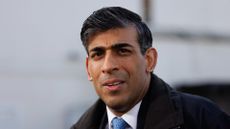 It's the economy, Sunak: has 'Rishession' halted Tory fightback?
It's the economy, Sunak: has 'Rishession' halted Tory fightback?Today's Big Question PM's pledge to deliver economic growth is 'in tatters' as stagnation and falling living standards threaten Tory election wipeout
By Harriet Marsden, The Week UK Published
-
 What will £28bn green investment U-turn cost Labour?
What will £28bn green investment U-turn cost Labour?Today's Big Question Dropping flagship pledge 'will confirm workers' scepticism of the endless promises of jam tomorrow', said union leader
By The Week UK Published
-
 Why your local council may be going bust
Why your local council may be going bustThe Explainer Across England, local councils are suffering from grave financial problems
By The Week UK Published
-
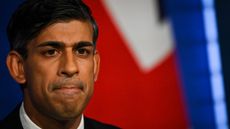 Rishi Sunak and the right-wing press: heading for divorce?
Rishi Sunak and the right-wing press: heading for divorce?Talking Point The Telegraph launches 'assault' on PM just as many Tory MPs are contemplating losing their seats
By Keumars Afifi-Sabet, The Week UK Published
-
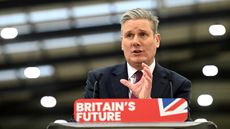 How many seats do Labour and the Tories need to win?
How many seats do Labour and the Tories need to win?In depth Changes to constituency boundaries mean Labour needs even bigger swing at next election to form a majority
By Sorcha Bradley, The Week UK Published
-
 How would a second Trump presidency affect Britain?
How would a second Trump presidency affect Britain?Today's Big Question Re-election of Republican frontrunner could threaten UK security, warns former head of secret service
By Harriet Marsden, The Week UK Published